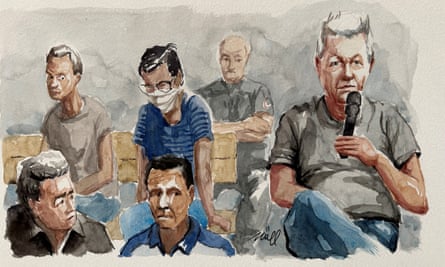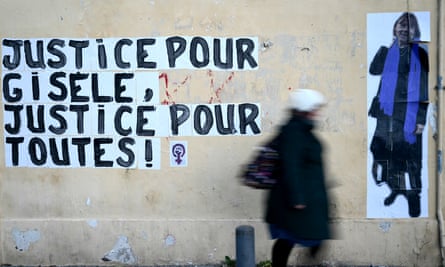Warning: this article contains descriptions of alleged rape and sexual assault
Dominique Pelicot called himself a family man. He liked cycling in the French countryside on a Sunday, he took his son and grandson to football matches, and he was good at celebrating birthdays.
“My parents had this talent for organising surprise birthday parties for us,” his eldest son, David, has said. “All our friends would be there, and my friends would say how lucky I was to have a dad like that. Everyone adored him at those parties – my friends saw him as a role model. He danced with my friends, he sat down to eat with my friends, and today those friends don’t understand what’s going on.”
Dominique, a 72-year-old retired electrician and estate agent, is now described by his family as the worst sexual predator in recent French history. Over a nine-year period from 2011 to 2020, he crushed sleeping tablets and anti-anxiety medication into his unsuspecting wife’s mashed potato, ice-cream, coffee or beer, and invited dozens of men he met online to come to the couple’s house in a village in Provence to rape her while she was unconscious.
He also hid cameras to secretly photograph and film his son’s wives in their own bathrooms or rooms in his home, including when one was pregnant with twins, and shared naked photographs of them online. He photographed his adult daughter asleep semi-naked, in underwear she didn’t recognise as her own, sparking her own fears that she too had been drugged and abused, though he denied in court ever abusing her. He repeatedly raped another man’s wife after teaching him how to use the same drugging technique. He had proposed teaching several other men how to drug their own girlfriends or wives – and even one man’s mother – suggesting he could rape them too.
Gisèle Pelicot, 72, has become a feminist hero for insisting that the rape trial of her now ex-husband Dominique and 50 other accused men should be held in public so that shame could change sides. The story of all these men and their alleged sex crimes must be told, she said, in order to end what she called “rape culture”, where sexual violence is so commonplace in society it is almost shrugged off, and because Pelicot and the men got away with it for so long.
On Saturday 12 September 2020, Dominique, a father of three and grandfather of six described by friends as a “jovial” guy, left his house with a nice garden and small pool in the picturesque village of Mazan in Provence, and drove 20 minutes to the large supermarket in the town of Carpentras. He and Gisèle, his wife of 50 years and a former logistics manager in an electricity firm, had retired to this village, filled with stone houses with pastel blue shutters, in 2013. Gisèle liked country walks and singing in a choir. She was away that weekend, taking care of her grandchildren in Paris.

It was a hot day and lots of women at the supermarket were wearing summer dresses and sandals. Dominique, dressed in a polo shirt and shorts, carried a black bag with a hidden camera in it. He loitered closely behind four women, holding the bag low to the ground and pointing it up their skirts. He photographed and recorded as one woman reached for an item from the dairy fridge, another as she looked at baby clothes in the children’s section.
Until two years earlier, upskirting in France had not been specifically addressed by its own legislation – some women who filed complaints said they were asked by police: “Why were you wearing a skirt?” But clearer laws and tougher penalties had been introduced in 2018. The outraged supermarket security guard who spotted Dominique filming immediately called the police and urged the women to file complaints. One woman, who at first had not noticed Pelicot filming up her skirt, wasn’t sure who to believe: the furious security guard making a big fuss, or the seemingly nice man with “puppy eyes” who looked like a “poor innocent”, she later said in a French TV interview. But she and the other women did report the offence.
The small team of police in Carpentras station were overworked that day on a pile-up of cases, including domestic violence and assault incidents. But when this white-haired pensioner told them he filmed up women’s skirts at the supermarket because his wife was away and he’d had an “urge”, they had a hunch to look closer at the chat history of the two phones he was carrying, which they confiscated. Then they searched his home.
They would find thousands of photos and videos of rape and abuse on Dominique’s phones, computer and hard-drive, leading to the biggest rape trial in French history, which is due to conclude on 20 December.
Dominique had messaged men on the unmoderated chat site Coco, which has since been shut down, offering them his wife while drugged. His conversations, which continued by phone or instant messaging, included lines such as: “I’m looking for a pervert accomplice to abuse my wife who’s been put to sleep” or “You’re like me, you like rape mode”. He spent time in a chatroom on the site called “Against her knowledge” where he shared photos of his unconscious wife. In a folder called “abuse” on his hard-drive, he had meticulously archived videos of more than 200 rapes of Gisèle by strangers where she was in a coma-like state, akin to being anaesthetised. Most took place in the couple’s bedroom, with the bedside lamps switched on, spotty pillowcases and burgundy wallpaper, family photos in a frame on the chest of drawers beside a jar of fragrance sticks, and the sound of the television on in the background. When the men arrived, Gisèle was seen limp and inert in the recovery position on the bed, snoring loudly, undressed or wearing underwear Dominique had bought and dressed her in.
Dominique would tell the men to help themselves. He would make degrading and obscene comments about “the slut” off camera while filming. He propped notes beside her that read: “Service slut” and “Whore”, or wrote on her body: “I’m a submissive slut”. Some men did thumbs up or victory signs to the camera.
Dominique told the court that he would get medication on prescription from his doctor and hide it in a sock in a hiking shoe in his garage. He would add it to his wife’s food or drink, usually at night, and had perfected a dose that would leave her unconscious for about seven hours – enough time for him and another man, or several consecutive men, to rape her, after which he would wash her and put her pyjamas back on.
His rules stated that the men should park nearby and walk to the house to avoid waking the neighbours, and they must take their clothes off in the kitchen. Most kept their socks on; one fire officer kept the top half of his uniform on with the name of the local fire service, which helped the police identify him. The men then had to warm their hands on the radiator, not smoke, drink alcohol or wear aftershave, whisper while in the bedroom, and wash their hands and have short nails because he couldn’t stand the idea of dirty fingernails on his wife. Condoms were not required, indeed sometimes discouraged – Gisèle now lives with the lifelong consequences of four sexually transmitted diseases. In court, some of the men said they hadn’t respected any rules on smoking or drinking. Some had smoked countless joints before arriving; one had drunk a bottle of whisky.
This went on for nine years, with an increase in visits during the year of Covid lockdowns. One of the men, Jérôme V, a grocery worker, went six times during lockdown. In court, he admitted to rape, saying he was attracted to the idea of being able to have “complete freedom of action” over an inert body.
A total of 50 men aged 26 to 74, including a nurse, a journalist, a soldier, a computer expert, farm workers, lorry drivers and shop workers, appeared in the four-month trial with Dominique and are awaiting their verdicts, which are due next week. If convicted, they face prison sentences of between four and 20 years.
Most of the men deny rape, saying they thought it was a consensual game orchestrated by a couple of swingers. Some said they had thought Gisèle was shy or would wake up, or that they didn’t know she was drugged. Several told investigators it wasn’t rape if Gisèle’s husband had consented for her. “He can do what he likes; it’s his wife,” one said. Others said in court that they now thought they had been drugged themselves. One said his body had somehow “disconnected from his brain”.

About 20 other men were never identified and are presumed to be still at large. None of the men accused of rape who turned up at the Pelicot home to find Gisele limp and not moving contacted police. Not even when Dominique boasted to them, the men told the court, that after drugging his wife, he would also take her to motorway laybys and “hand her to men”. (Dominique later told the court that he did not hand his then wife to men at roadsides, but had once drugged and raped her himself in a motorway layby on the way back from their daughter’s holiday home.) One electrician who denied raping Gisèle said he had called Dominique “sick” when, after an alleged rape, he mentioned the motorway laybys at the couple’s bedside. But the electrician said he hadn’t wanted to “waste my time at the police station”, because he said he wouldn’t have been believed.
A 42-year-old lorry driver, who decided not to go to the Pelicots’ home but was called as a witness, told the court he worried about something “bizarre” taking place when he was contacted by Dominique on Coco, asking if he would do some gardening work for him. He would then pay him by “offering you my wife”, who would be asleep. The man did not accept the offer and stopped all contact. But he said he didn’t call the police because it was “difficult to report things you haven’t seen” and “I didn’t want my wife to know I went on websites like that.”
One of the key questions that will remain long after the verdict is how Dominique had not been stopped before 2020, given he had previously come to the attention of police. In the summer of 2010, a decade before his arrest for upskirting in the Carpentras supermarket, he was caught filming up women’s dresses with a small camera hidden in a pen in a supermarket in the Seine-et-Marne area east of Paris, near where he and Gisèle lived. He was arrested and accepted a fine of €100 to avoid going to court. (During the trial this year, he told the court that he wasn’t good at secretly filming up skirts, only ever managing three or four pictures before getting stopped.) “I was never informed,” Gisèle said in court. If she had been told, she said, she would have taken notice and acted; she would not have lost “10 years of my life”.
After his arrest in 2010, Dominique’s DNA was collected by police. When it was entered into a national database, it matched with a trace of blood found on a shoe at the scene of an attempted rape of a young estate agent outside Paris in 1999. At that time, Dominique was 46 and had previously worked as an estate agent himself. The attacker had walked into an estate agent’s office in the Seine-et-Marne area and said he wanted to urgently view a top-floor rental flat, giving a false name and address. The young estate agent tasked with showing the man round was 19 and had just started working there. Once in the flat, she was pushed to the ground on her stomach, her hands tied behind her back with rope and her mouth and nose covered with fabric soaked in ether, which can have an anaesthetic effect. “It smelled very strong … it made my head turn,” the woman later told investigators. “I was a prisoner in my body and felt I couldn’t move.” Some of her clothes were removed by her attacker, who placed her shoes neatly beside her. She felt a knife held to her neck. She came round and fought back, managing to lock herself in a cupboard, and the man left.
The 2010 DNA evidence that showed a match with Dominique did not make it into the case file at the time – it is unclear why. Possibly communications went astray. But the cold case was reopened by an investigating magistrate in Nanterre after his 2020 arrest for raping his wife. Questioned by police in 2022, Dominique first denied any involvement, until he was presented with the DNA evidence. He then admitted attempted rape but denied using a knife as a weapon. He told police he had had an “urge” the moment he saw the woman, but that when he took her trousers off he’d realised she was the same age as his daughter and he had felt “blocked”. Gisèle had no idea this had happened either. “When I discovered that he’d attempted to rape a young woman the same age as his daughter, it was like an explosion,” she said in court.
Police also noticed that there were similarities between that incident and the 1991 rape and murder of another estate agent, aged 23, who had also just started out in her job. A man who gave a false name and address had asked to look at a top-floor flat in Paris. The estate agent, who had been strangled to death and knifed, was found on her stomach, hands tied behind her back, shoes carefully placed beside her, with a smell of ether in the room and traces of ether in her blood. Dominique has denied any involvement. He has been placed under formal investigation for both crimes and the investigation continues.
By November 2020, when the police told Gisèle that they had found videos of her being raped, she had already become so concerned about her regular blackouts, moments of memory loss, brain fog and terrible fatigue, she was sure she would soon be told she was incurably ill. She had feared Alzheimer’s, Parkinson’s or a brain tumour, even if scans and tests kept coming back negative. None of the many neurologists and doctors she consulted suspected drugging or tested for it. She thought her husband was “a love” for insisting on coming with her to all her appointments and reassuring her she was fine. But weird things were happening. She sometimes slept 18 hours straight without waking up in the morning. Once she went to a hairdresser’s appointment for a colour, cut and blow-dry but had no recognition of it when later at home she looked in the mirror. She stopped driving alone, and when on a train to Paris to visit her children and grandchildren, she would pinch her thigh constantly, worried she would fall asleep and miss her stop.
Once, she noticed that a new pair of her trousers had bleach marks on them and she had no recollection of how. “You’re not drugging me by any chance, are you?” she asked her husband as a joke. He burst into tears and asked how she could accuse him of such a thing, so she never made that type of joke again. Her husband told her she was just tired from looking after her grandchildren.
Gisèle went to gynaecologists over discomfort and strange symptoms. Again, Dominique always accompanied her. “I consulted three gynaecologists. Several times I had woken up and felt as if I had lost my waters – as happens when you give birth,” she told the court. Once her husband joked to her: “But what are you doing at night?”, implying she was having affairs. She never suspected him, thinking him a wonderful guy.
“Sometimes in a conversation, she’d just switch off,” her eldest son, David, told the court. Once her two young grandchildren had been surprised she wasn’t up for breakfast and had tried to shake her awake in her bed and were shocked when she didn’t move. At a family dinner, her youngest son, Florian, had noticed his father offer his mother a glass of rosé. After she drank it, he says she became groggy, staring ahead, while Dominique rushed to put her to bed.

Florian had also started noticing that his father was possessive over his computer and camera and that he had been using pornography. Aurore, Florian’s then wife, had walked in on him masturbating in front of the computer. One summer, while visiting his parents in Mazan, Florian was printing out colouring sheets from the cartoon Paw Patrol for his children and came across an empty file on his father’s computer called “Martine’s knickers”. Aurore, who told the court she was raped by her grandfather, who was a gendarme, as a child, was concerned when she heard Dominique complaining to one of his grandchildren that they never liked “playing doctors” with him. An investigation continues into whether Dominique might have abused any of his grandchildren. He denies this.
Throughout the trial, one question was raised again and again: why had Dominique done it? Why had he started drugging his wife of 50 years, whom he called a “saint”? He told the court that Gisèle had saved him from his awful childhood, during which he said he was raped aged nine by a nurse in hospital, and as a 14-year-old apprentice on a building site said he had witnessed – and was forced to take part in – a group-rape of a woman he described as disabled. His father, the court heard, was controlling and tyrannical, and was suspected of having groomed a young girl with disabilities whom he fostered and later made his partner.
Had Dominique started to abuse his wife because it was easier than hunting other women? He told the court that he had a dark side, that from the age of 60 he found himself more “demanding” in terms of sex and that there were things his wife wouldn’t do, so he drugged her to do them to her while she was unconscious. He said he couldn’t stop and at one point was drugging and raping her two to three times a week. Gisèle told the court she didn’t feel herself going under when drugged and had no memory of the events. “I went to bed in my pyjamas, I woke up in my pyjamas,” she said. One of her lawyers, Antoine Camus, suggested Dominique, by drugging his victim, was trying to commit “the perfect crime”.
Dominique said that it was once the couple had retired and moved to Mazan in 2013 that he stepped up inviting men to rape his wife. He said he made it clear to them that she would be drugged unconscious. Most came from within a 40-mile radius of the village, one drove two and a half hours from Lyon, another was dropped off by car by his girlfriend who waited for an hour in a car park nearby. She thought he was meeting a couple for a sexual encounter, but said she didn’t ask for details.
The earliest case identified by police was Adrien L, the privately educated son of a local businessman. He is alleged to have raped Gisèle in her bedroom in March 2014, when he was 23 and she was 62. His pregnant girlfriend gave birth to their son 10 days later. He told the court he had had a “hatred of women” since discovering that a daughter born to a previous girlfriend was not his biological child. He was jailed for 14 years after a separate trial earlier this year for rape and violence against three ex-girlfriends in 2017 and 2018. He denied raping Gisèle, telling investigators he thought it was a scenario the couple had agreed on and that “from the moment the husband was present, it wasn’t rape”. In court, he repeated his denial, saying he had not known Gisèle was drugged.
Over the following years, Dominique said bringing in men to rape his wife became an “addiction” that spiralled. No day in the calendar was sacred: men are alleged to have raped Gisèle on her birthday and on New Year’s Eve, and not just in her bed in Mazan but while the Pelicots were staying at their daughter’s home in the Paris area during the Christmas holidays. Once, while they were at their daughter’s holiday cottage on the Île de Ré in the west of France, Dominique went online and invited round a retired nightclub worker. The man, who in 1999 was sentenced to five years in prison for raping his 17-year-old daughter, denies raping Gisèle.
On Valentine’s Day 2015, Dominique invited a lorry driver and former soldier called Dominique D into their home, saying the encounter was a “gift” for his wife who lay limp and unmoving on the bed. Dominique D became one of a few regulars, returning another five times until 2020. In court, he denied rape, saying he did not wake up one morning saying “today I’m going to go to a couple’s house and commit a crime”.
The men came from a range of professions and backgrounds. One 40-year-old father of three worked in the culture and tech aisle of the same supermarket where Dominique was arrested for upskirting. He told the court that Dominique had suggested he glimpse an unsuspecting Gisèle while she was shopping to see if he was attracted to her. He admitted rape but said he had “not intended” to commit rape.
A guard at the prison where Dominique was first held after his arrest in 2020 was also arrested and charged with having raped Gisèle in her bedroom the previous year. The 29-year-old admitted rape, saying he’d realised in his car afterwards while driving home that “something wasn’t right”.
The overriding question, set out by Camus in his final statement to the court, was what was the common denominator between all these men? Was there something that might explain their behaviour? Camus said there wasn’t one. He said these were men who simply chose to rape.
The court heard that many of the accused had been sexually abused as children – perhaps up to 40%, including one who was the victim of a notorious child-abuser and murderer. Another was raped by his father as a very young child, and was placed in care where he continued to be abused. Dominique told his trial “you’re not born a pervert, you become one”, suggesting that the rapes that he admitted to were linked to his own abuse as a child. But, as one court psychiatrist, Laurent Layet, told the trial, it was “very important” to point out that scientifically there is no relationship of cause and effect. “It is not because you have been a victim that you become a perpetrator,” he said.

Some of the accused had childhoods of neglect and abuse so bad it amounted to what the same psychiatrist in one case called “torture”: one compared his father to Hitler, another had said he was raised by “pigs in the woods”. Others described growing up happy with piano lessons and “lacking for nothing”; one said his Provence childhood was so idyllic it was like a book by the writer Marcel Pagnol. Some had criminal records for domestic violence, driving offences or theft, others didn’t. Some were married, some were single. Some had struggled at school, one had two degrees. Several were hooked on cannabis, others didn’t smoke. Five were accused, at the time of their arrest, of possessing child abuse imagery – which some denied, some admitted. Many used pornography – some paid for sex. “What truck driver hasn’t been to prostitutes?” asked one international lorry driver, who denied raping Gisèle.
As the dozens of men from all walks of life filed into court during the trial, sometimes they were referred to in media coverage as “Mr Average” or ordinary guys. But as Layet said in court, in medical and legal terms they could not be called ordinary men, “because that would be saying that all men were capable of this”. Nor could he say they were “monsters”, as most of them did not have the criminological profile of serial killers.
Gisèle has said there are lessons to be learned about the scale of rape and abuse in France. “The profile of a rapist is not someone met in a car park late at night,” she told the court. “A rapist can also be in the family, among our friends.”
Aurore, the ex-wife of the Pelicots’ youngest son, told the court: “We’re asking the question today: how can we get into this situation? How can a human being do something like this? There is no one profile of a rapist. My grandfather who abused me was a gendarme – that’s ironic, a man supposed to protect us, but who abused.” But she said the trial was indicative of modern society where abuse has become a “banality” because “abuse is everywhere”.
Despite this case, she said she still had faith in humanity: “I still believe in human beings.” But she said society needs to look at “how we got to this, about how the things that happened in this trial could take place” in order to protect future generations. “That is what’s at stake.”

.png) 1 month ago
15
1 month ago
15













































